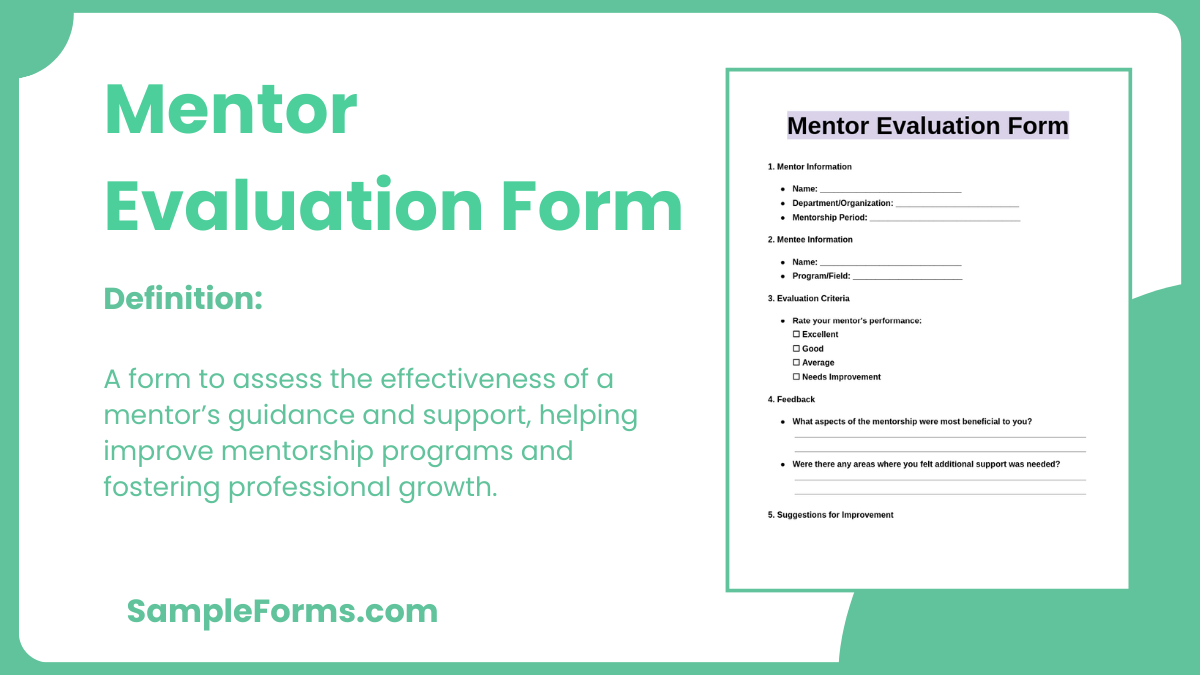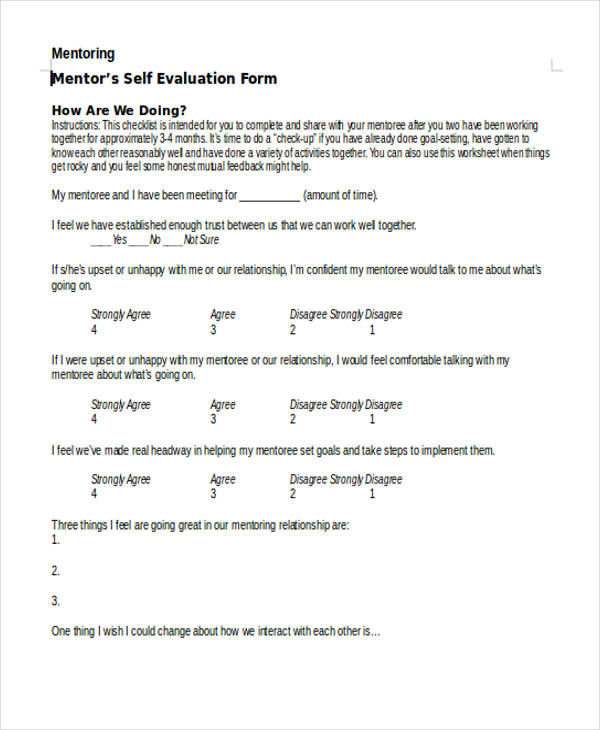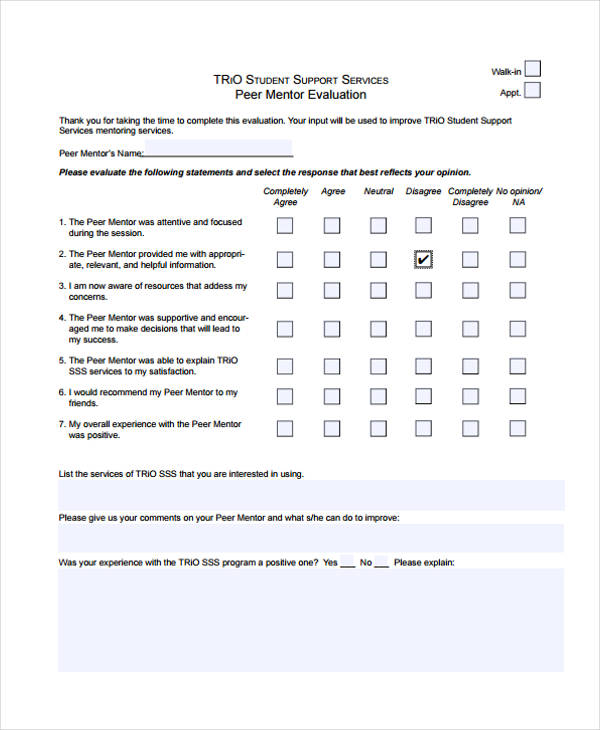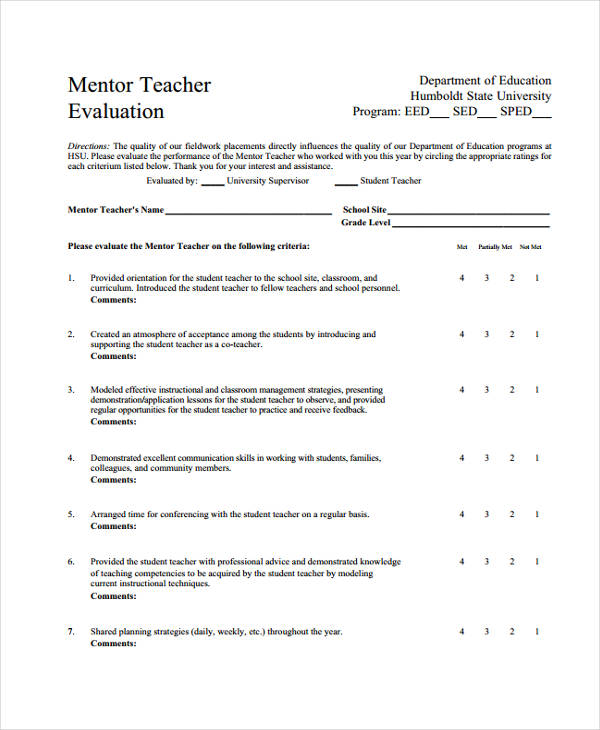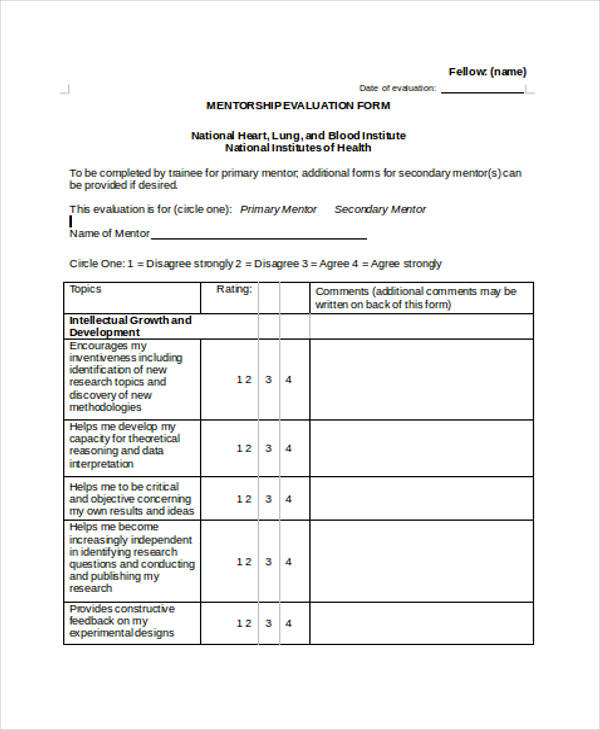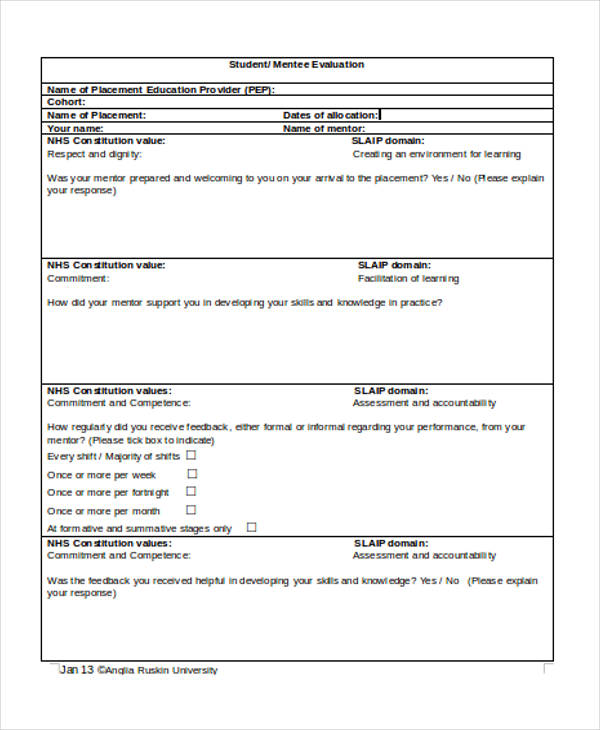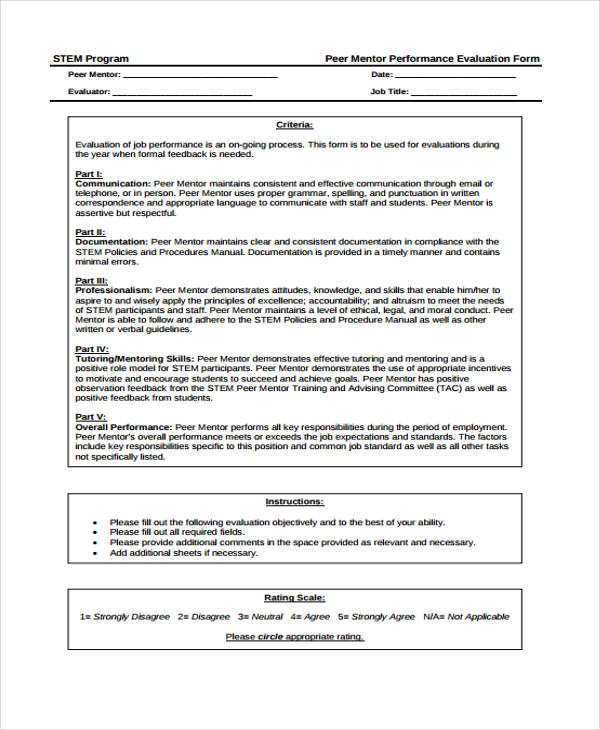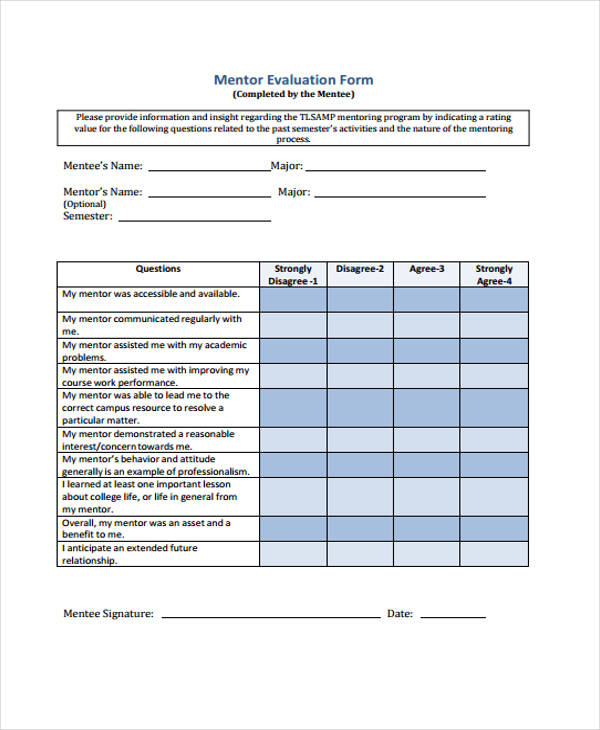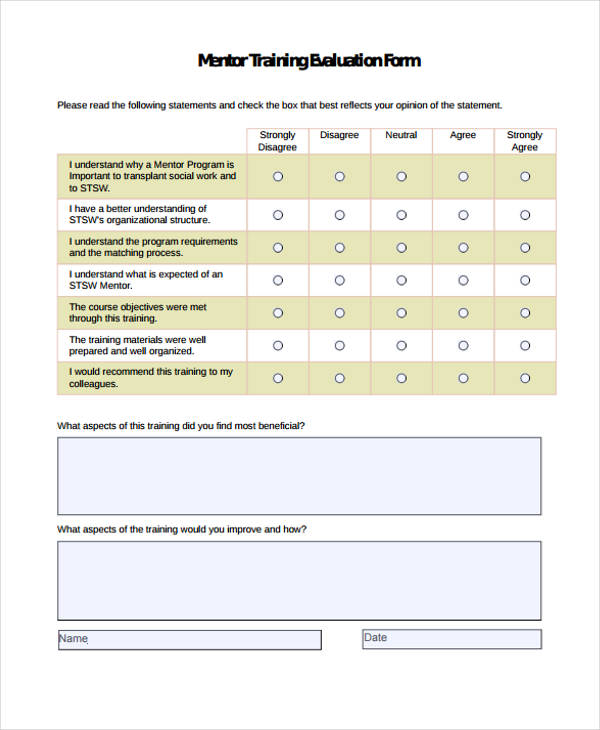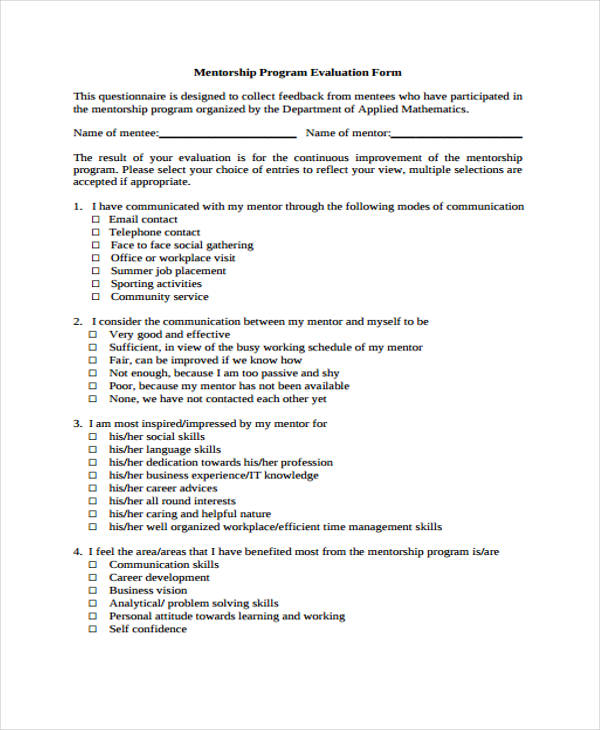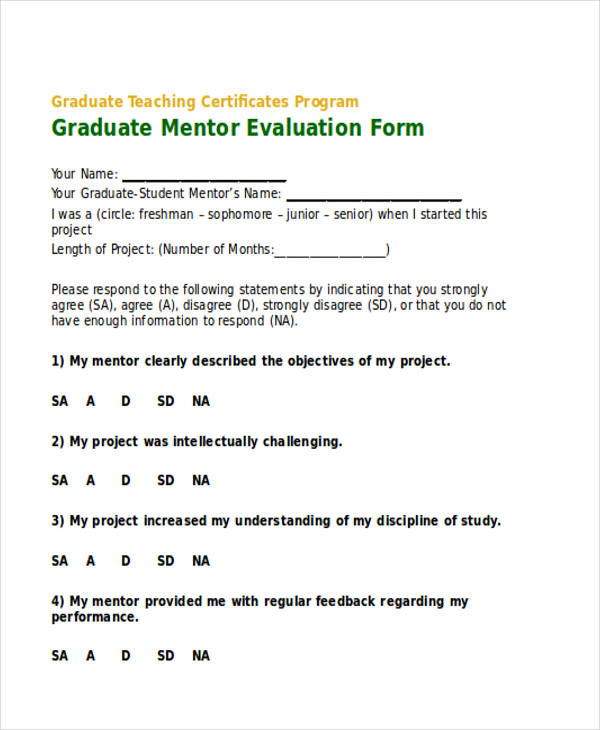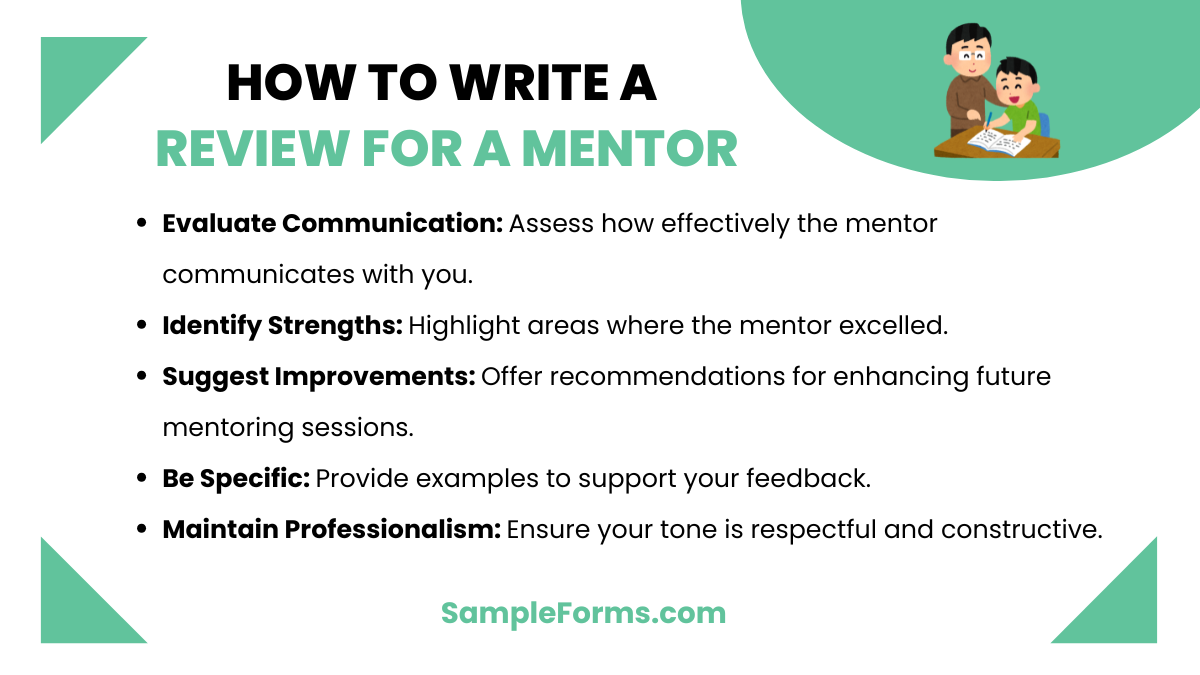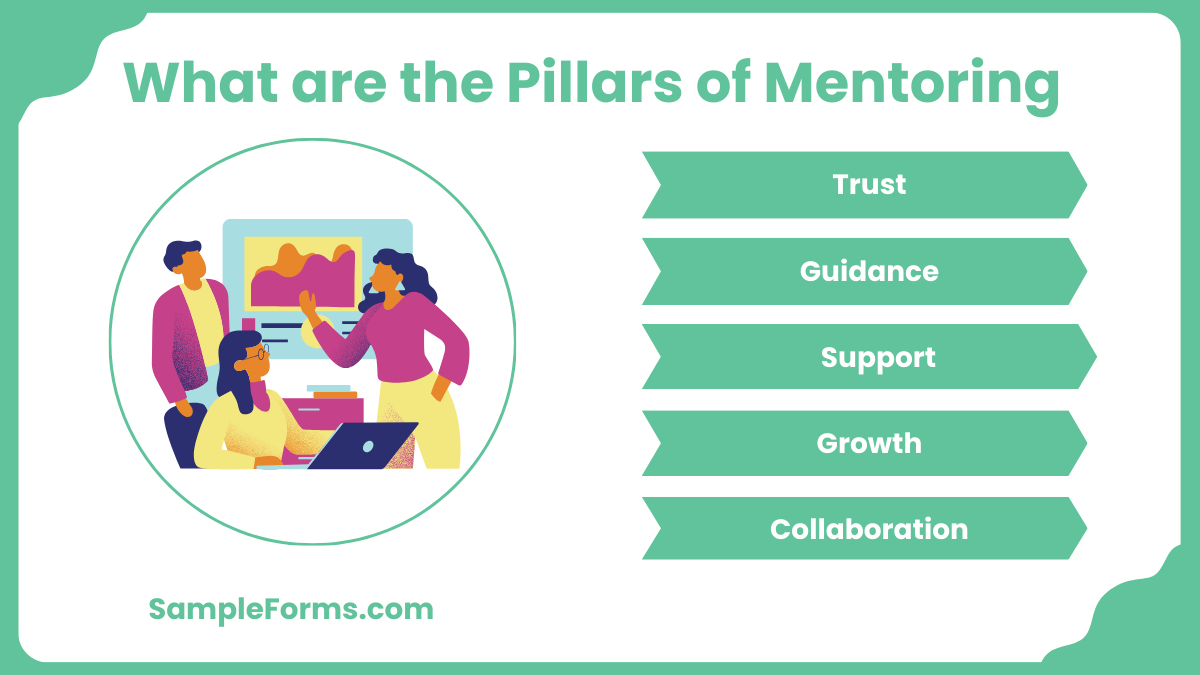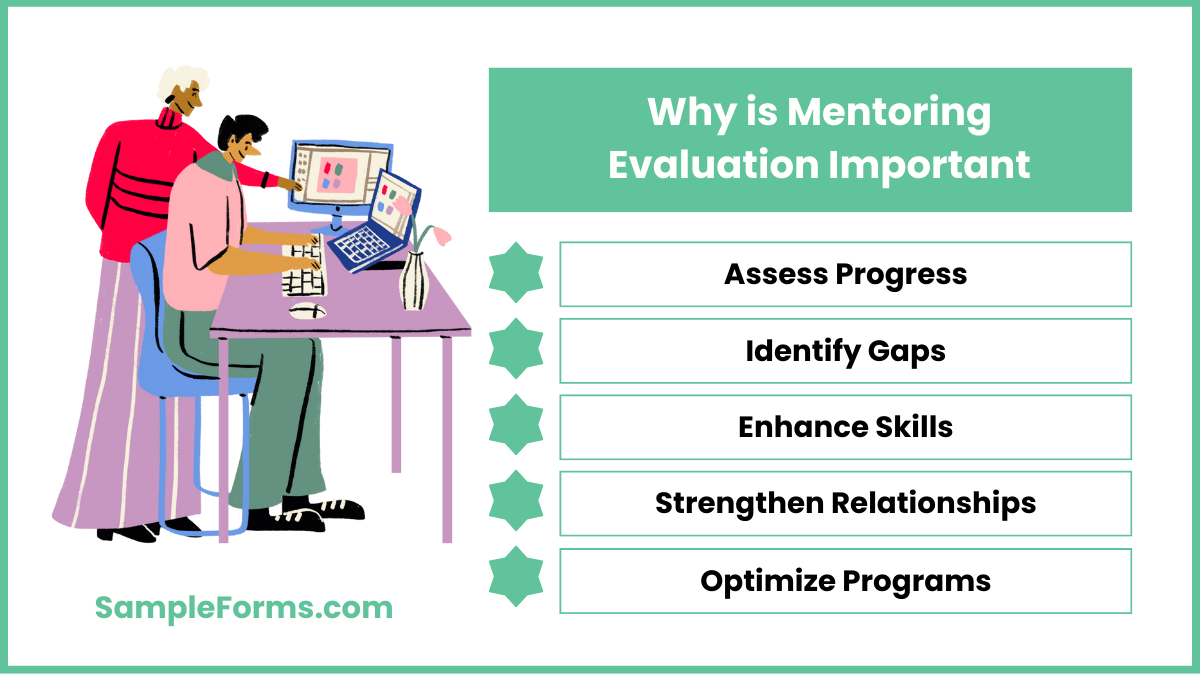A Mentor Evaluation Form is a vital tool for assessing the impact and effectiveness of mentoring programs. Designed to collect constructive feedback, this Evaluation Form helps mentors and mentees align their goals and address any challenges. By including key sections such as communication skills, program objectives, and areas of improvement, the form fosters meaningful connections and better program outcomes. This guide explores the essential elements and best practices for creating tailored evaluation forms that ensure mutual growth and professional development.
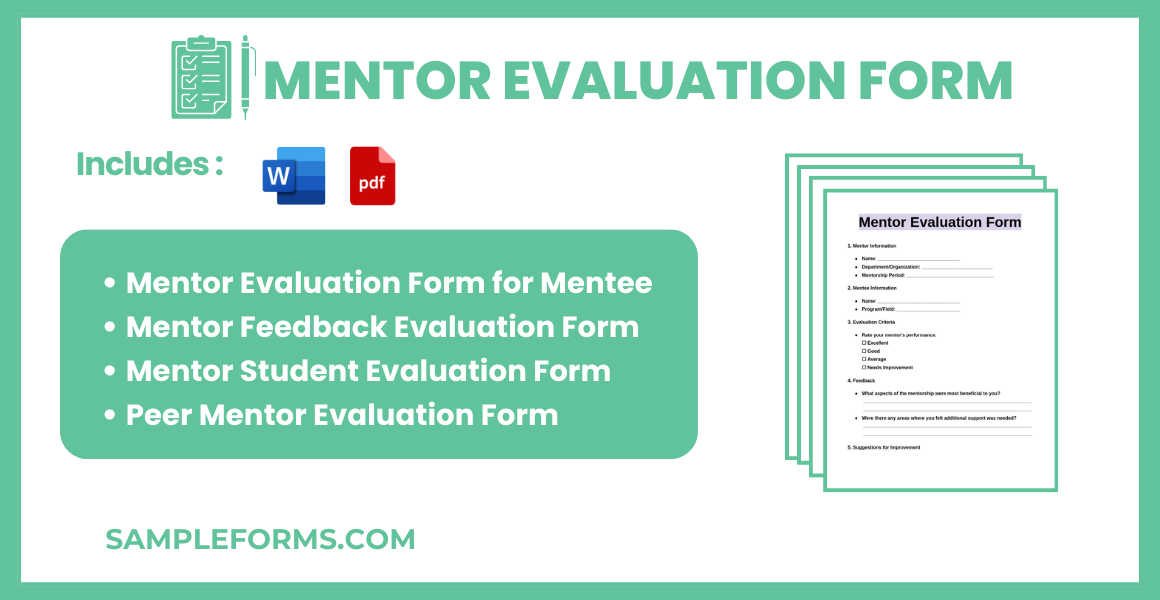
Download Mentor Evaluation Form Bundle
What is Mentor Evaluation Form?
A Mentor Evaluation Form is a feedback tool used to assess a mentor’s performance and identify areas of improvement. It collects valuable insights on communication, guidance, and goal achievement. These forms enable organizations and mentees to evaluate the mentoring experience, ensuring both parties achieve desired outcomes. Designed to promote transparency and improvement, the form fosters professional relationships and strengthens mentorship programs effectively.
Mentor Evaluation Format
1. Mentee Information
- Name: _________________________________
- Program: _______________________________
- Evaluation Period: ______________________
2. Evaluation Criteria
- Guidance Provided: ______________________
- Communication Skills: ____________________
- Availability: ____________________________
3. Overall Feedback
- Strengths: ______________________________
- Areas for Improvement: ___________________
4. Final Assessment
- Overall Rating: _________________________
5. Signatures
- Evaluator Signature: ___________________ Date: ________
Mentor Evaluation Form for Mentee
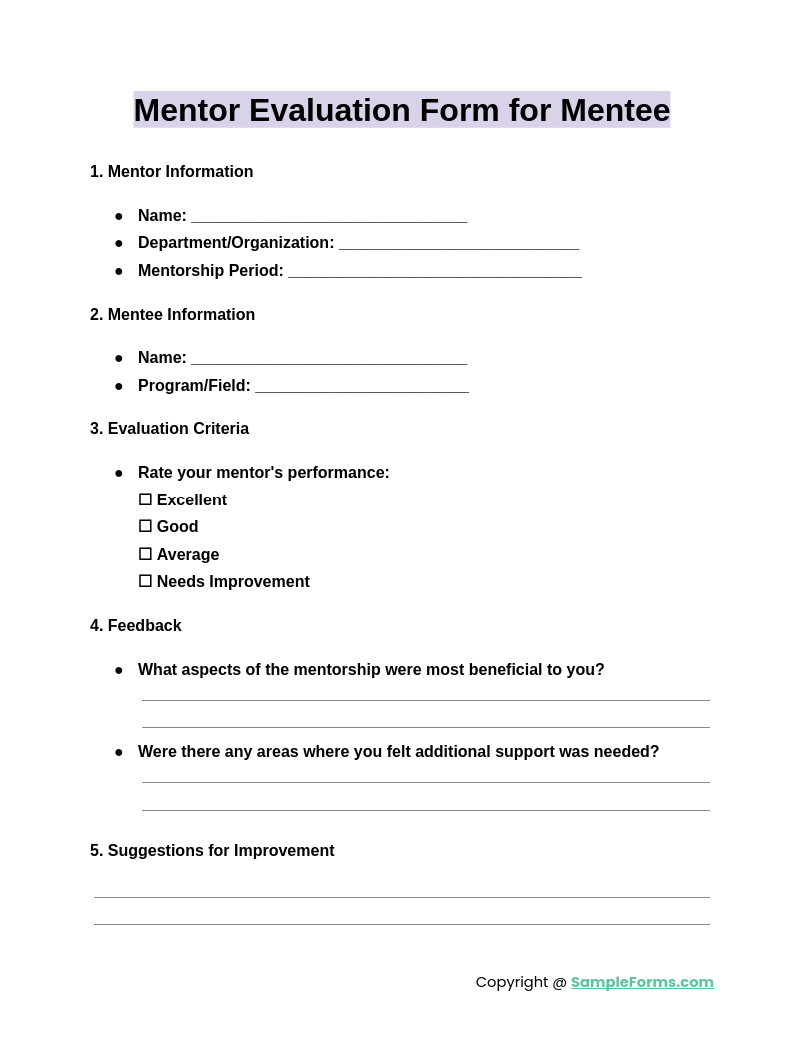
The Mentor Evaluation Form for Mentee gathers insights on mentorship quality from mentees, ensuring feedback for growth. Similar to a Home Evaluation Form, it assesses communication, guidance, and overall mentor effectiveness, fostering stronger professional relationships.
Mentor Feedback Evaluation Form
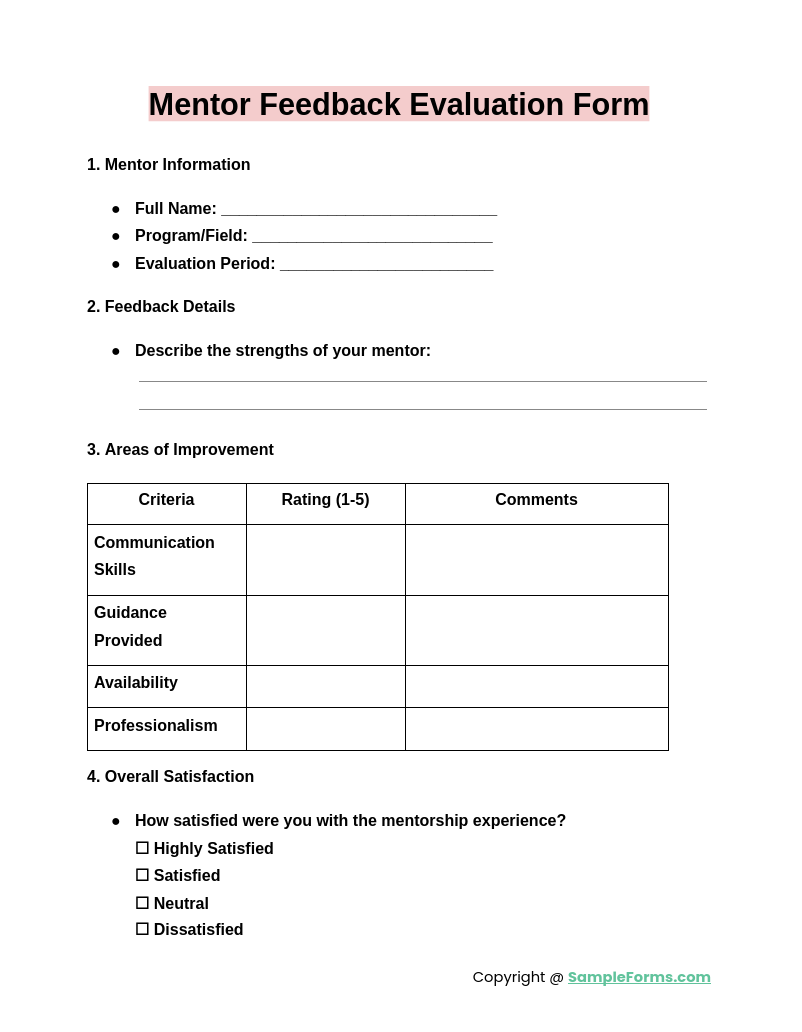
A Mentor Feedback Evaluation Form collects constructive feedback on mentoring sessions, focusing on mentor performance. Like an Event Evaluation Form, it ensures detailed analysis, guiding improvements and enhancing mentor-mentee collaboration for future success.
Mentor Student Evaluation Form
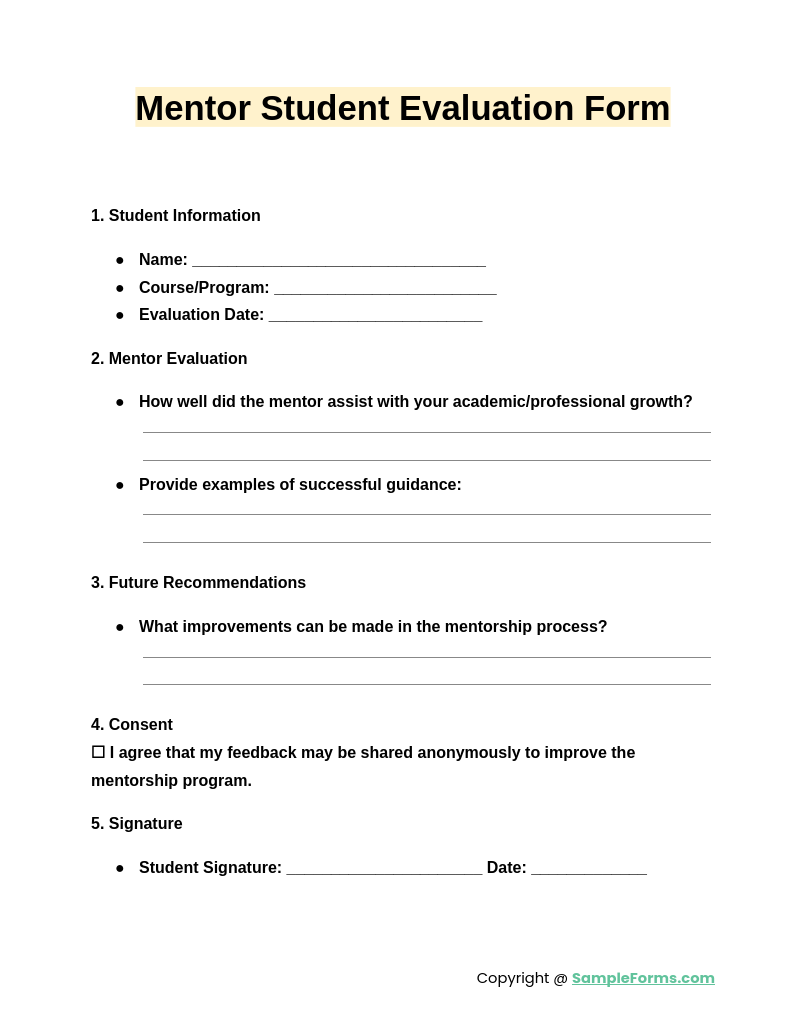
The Mentor Student Evaluation Form evaluates the mentor’s ability to support student growth, identifying improvement areas. Similar to a Product Evaluation Form, it provides actionable insights into mentorship effectiveness and the overall student experience.
Peer Mentor Evaluation Form
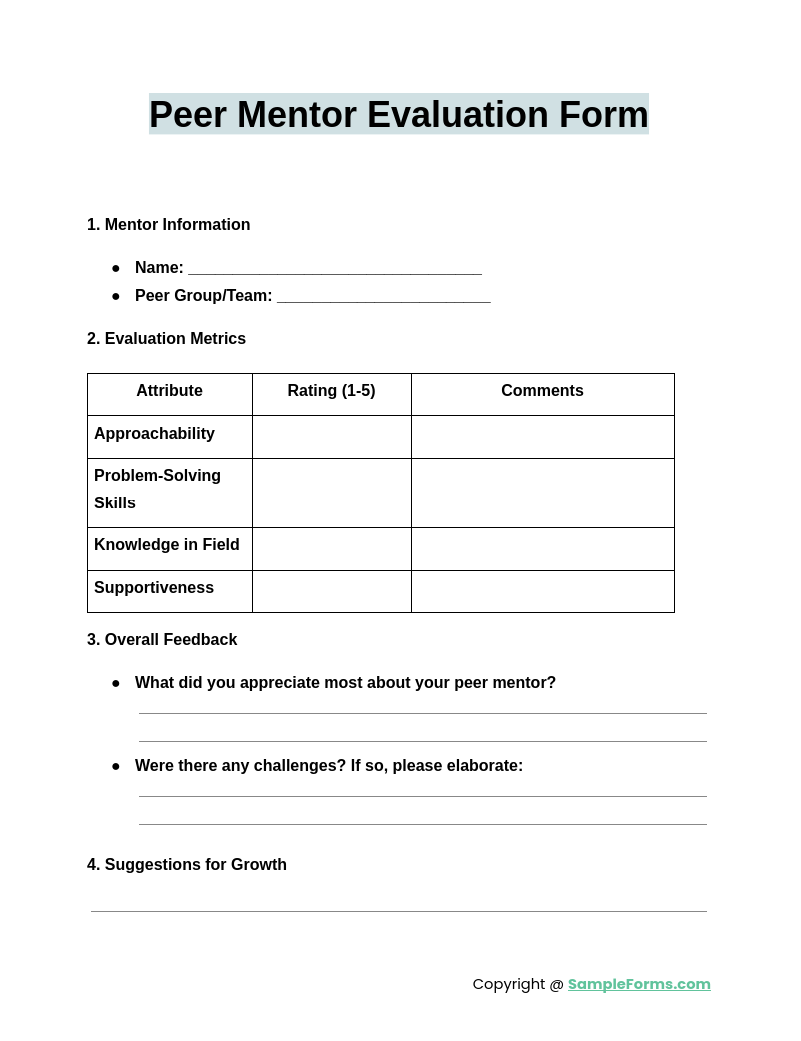
The Peer Mentor Evaluation Form evaluates peer mentoring relationships, focusing on communication, support, and collaboration. Like a Volleyball Evaluation Form, it identifies strengths and areas for improvement, ensuring enhanced teamwork and personal development.
Browse More Mentor Evaluation Forms
Mentor’s Self Evaluation Form
Peer Mentor Evaluation
Mentor Teacher Evaluation Form
Fellow Evaluation of Mentorship Form
Student Evaluation
Peer Mentor Performance Evaluation
Free Mentor Evaluation Form
Mentor Training Evaluation Form
Mentorship Program Evaluation Form
Graduate Mentor Evaluation
How to write a review for a mentor?
Writing a review for a mentor involves reflecting on their guidance and communication skills. Similar to a Training Evaluation Form, focus on constructive and actionable feedback.
- Evaluate Communication: Assess how effectively the mentor communicates with you.
- Identify Strengths: Highlight areas where the mentor excelled, like their approachability or expertise.
- Suggest Improvements: Offer recommendations for enhancing future mentoring sessions.
- Be Specific: Provide examples to support your feedback.
- Maintain Professionalism: Ensure your tone is respectful and constructive.
What are the golden rules of mentoring?
The golden rules of mentoring involve building trust, maintaining respect, and fostering open communication. Like an Employee Self Evaluation Form, these rules ensure mutual growth and understanding.
- Establish Trust: Build a foundation of honesty and confidentiality.
- Set Clear Goals: Define objectives for the mentoring relationship.
- Provide Feedback: Offer constructive guidance for improvement.
- Stay Committed: Dedicate time and effort to the mentoring process.
- Respect Boundaries: Maintain professional and personal boundaries.
What are the pillars of mentoring?
The four pillars of mentoring are trust, guidance, support, and growth. Similar to a Peer Evaluation Form, these elements build a productive relationship.
- Trust: Foster an environment of openness and honesty.
- Guidance: Offer clear and actionable advice.
- Support: Be available to address mentee concerns and challenges.
- Growth: Focus on the mentee’s personal and professional development.
- Collaboration: Encourage mutual learning and shared experiences.
How do you evaluate coaching and mentoring?
Evaluating coaching and mentoring involves reviewing their effectiveness through structured feedback. Similar to an Interview Evaluation Form, this process ensures continuous improvement.
- Set Metrics: Define criteria for evaluation, such as goal achievement or communication effectiveness.
- Collect Feedback: Use structured forms for feedback from both mentors and mentees.
- Analyze Data: Assess strengths and areas for improvement.
- Implement Changes: Act on feedback to enhance the mentoring process.
- Monitor Progress: Regularly review mentoring outcomes for sustained development.
Why is mentoring evaluation important?
Mentoring evaluation ensures the effectiveness of the mentoring relationship. Like a Call Monitoring Evaluation Form, it identifies areas for improvement and tracks progress.
- Assess Progress: Measure outcomes against established goals.
- Identify Gaps: Highlight areas needing attention or adjustment.
- Enhance Skills: Provide mentors with actionable feedback.
- Strengthen Relationships: Improve mentor-mentee dynamics.
- Optimize Programs: Refine mentoring practices for better outcomes.
What is a positive message for a mentor?
A positive message acknowledges the mentor’s guidance and support. A Speech Evaluation Form can help articulate impactful feedback for mentors effectively.
What are the weaknesses of a mentor?
Weaknesses may include limited availability, lack of feedback, or misaligned goals. Similar to a Supplier Evaluation Form, identify areas for constructive improvement.
How do you measure the impact of coaching and mentoring?
Measure impact through mentee growth, goal achievement, and feedback. Like a Contractor Evaluation Form, use metrics to ensure measurable success in mentoring.
What are positive comments for mentors?
Positive comments highlight mentors’ effective guidance, communication, and support. Using tools like a Nurse Evaluation Form ensures detailed, meaningful feedback.
How do you value mentorship?
Mentorship is valued through professional growth and skill development. An Internship Evaluation Form captures the mentee’s experience and mentor’s impact accurately.
How do you measure success of mentorship?
Success is measured by mentee progress, feedback, and relationship quality. Similar to a Debate Evaluation Form, evaluation criteria ensure objective assessment.
What are the core values of a mentor?
Core values include trust, empathy, and accountability. Tools like a Food Evaluation Form can provide structured feedback on these key mentorship aspects.
What does a successful mentor look like?
A successful mentor fosters growth, offers support, and communicates effectively. Use a Course Evaluation Form to review mentoring effectiveness.
How to assess a mentor?
Assess mentors through structured feedback, mentee outcomes, and goal alignment. A Mentee Evaluation Form ensures comprehensive evaluation of mentoring contributions.
What does a good mentoring session look like?
A good session includes clear goals, constructive feedback, and active communication. A Sensory Evaluation Form ensures detailed assessment of session effectiveness.
The Mentor Evaluation Form is essential for enhancing mentoring relationships and achieving program goals. Similar to a Group Evaluation Form, it ensures structured feedback, driving mutual growth and fostering productive mentorships. Use this guide to craft impactful forms that facilitate meaningful evaluations, improve communication, and strengthen mentor-mentee connections for long-term success.
Related Posts
-
FREE 6+ Business Credit Checklist Forms in PDF
-
Employee Pay Increase Form
-
Chef Evaluation Form
-
FREE 8+ Kitchen Evaluation Forms in PDF | MS Word
-
Customer Service Evaluation Form
-
FREE 15+ Grant Evaluation Forms in PDF | MS Word
-
FREE 14+ Volunteer Evaluation Forms in PDF
-
Mentee Evaluation Form
-
Speaker Evaluation Form
-
FREE 14+ Vehicle Evaluation Forms in PDF
-
FREE 14+ Trainee Evaluation Forms in MS Word | PDF
-
Resume Evaluation Form
-
FREE 14+ Retreat Evaluation Forms in PDF
-
Debate Evaluation Form
-
FREE 14+ Book Evaluation Forms in PDF | MS Word
